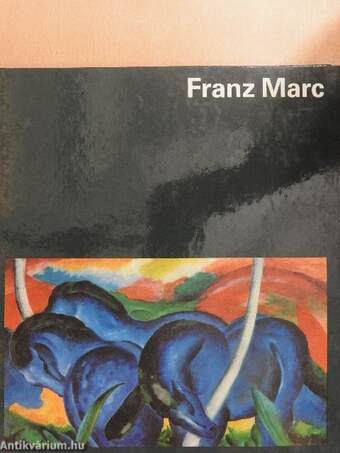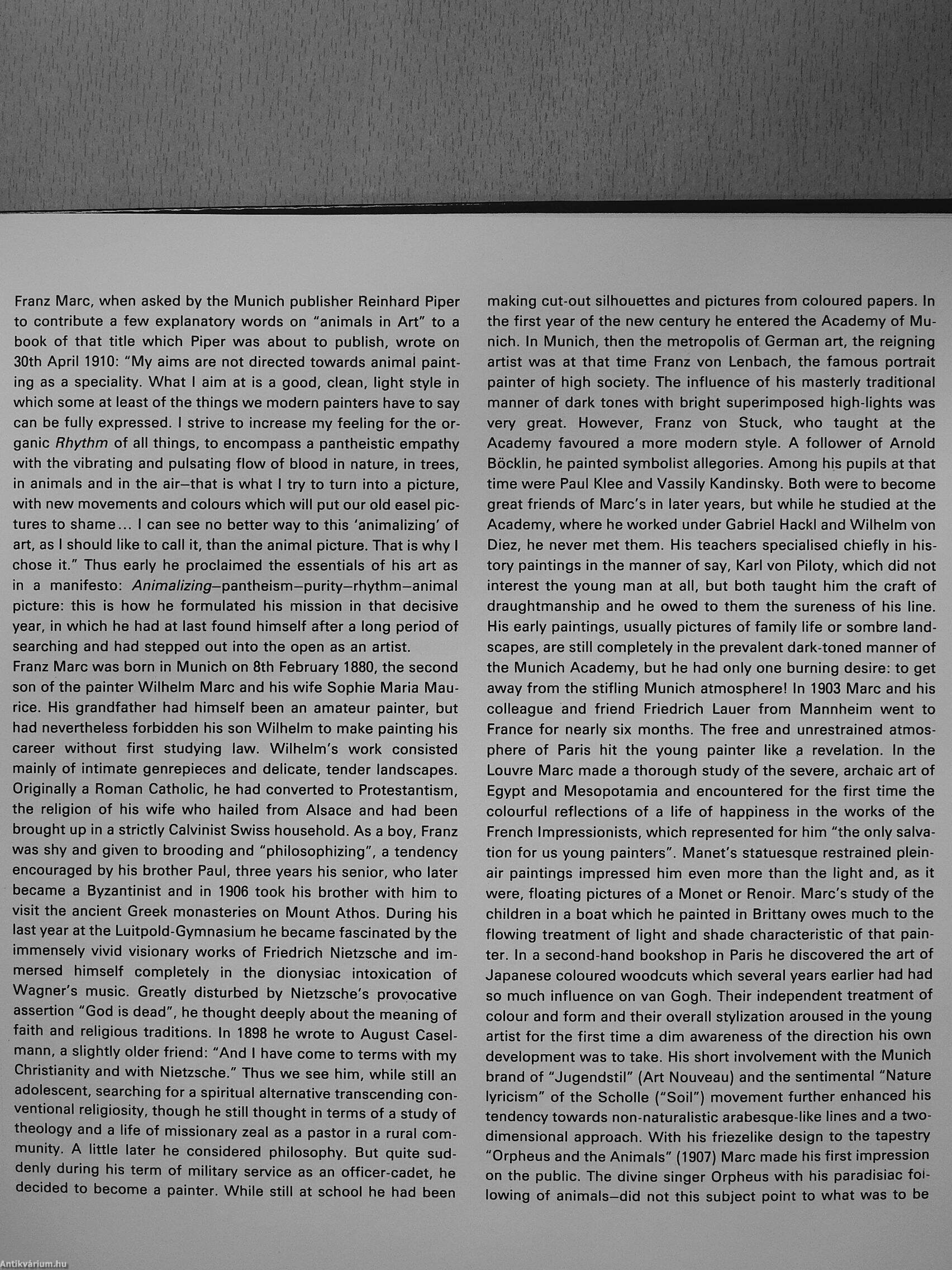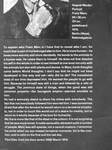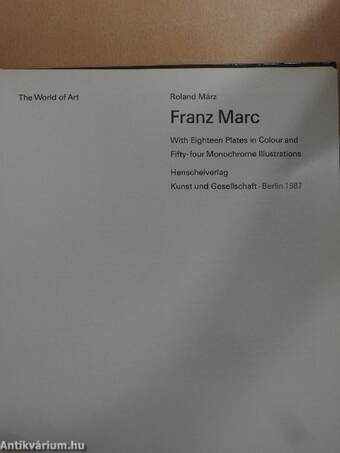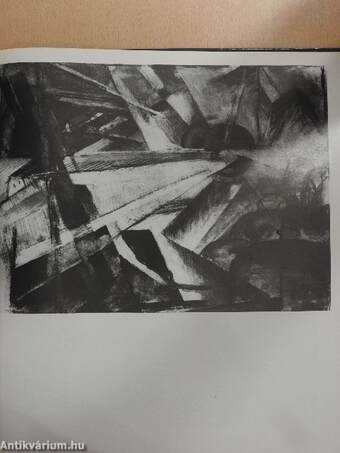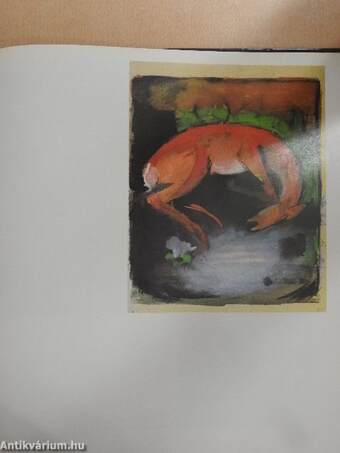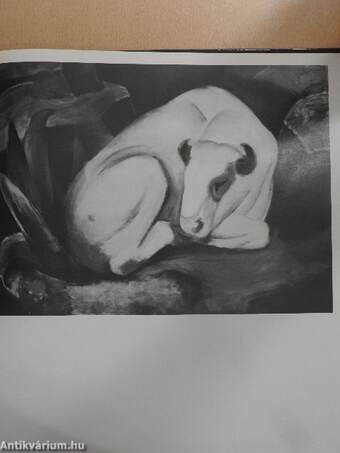1.067.675
kiadvánnyal nyújtjuk Magyarország legnagyobb antikvár könyv-kínálatát

VISSZA
A TETEJÉRE
JAVASLATOKÉszre-
vételek
Franz Marc
| Kiadó: | Henschelverlag Kunst und Gesellschaft |
|---|---|
| Kiadás helye: | Berlin |
| Kiadás éve: | |
| Kötés típusa: | Fűzött kemény papírkötés |
| Oldalszám: | 72 oldal |
| Sorozatcím: | The World of Art |
| Kötetszám: | |
| Nyelv: | Angol |
| Méret: | 28 cm x 24 cm |
| ISBN: | 3-362-00043-6 |
| Megjegyzés: | Színes és fekete-fehér reprodukciókkal. |
naponta értesítjük a beérkező friss
kiadványokról
naponta értesítjük a beérkező friss
kiadványokról
Előszó
TovábbFülszöveg
m
August Macke: Portrait Franz Marc. 50x38 cm. Oil on
pasteboard. 1910.
Berlin (West), Nationalgalerie
To explain who Franz Marc is I have first to reveal who I am; for much that is part of me belonged also to him. He is more human—he loves more warmly and more decidedly. He bends to the animals in a human way. He raises them to himself. He does not first dissolve his self in the whole in order to see himself at one level not only with the animals but also with plants and stones. In Marc, Earth thoughts come before World thoughts. I don't say that he might not have developed in that way and yet—why did he die? The transitional state of our time depressed him. He wanted the people to go with him. Because he himself was still a man and fettered by a relic of struggle. The previous state of things, when the good was still common property—the bourgeois empire—seemed enviable to him.
He had a womanly desire to share his riches with everybody. The fact that not everybody followed... Tovább
Fülszöveg
m
August Macke: Portrait Franz Marc. 50x38 cm. Oil on
pasteboard. 1910.
Berlin (West), Nationalgalerie
To explain who Franz Marc is I have first to reveal who I am; for much that is part of me belonged also to him. He is more human—he loves more warmly and more decidedly. He bends to the animals in a human way. He raises them to himself. He does not first dissolve his self in the whole in order to see himself at one level not only with the animals but also with plants and stones. In Marc, Earth thoughts come before World thoughts. I don't say that he might not have developed in that way and yet—why did he die? The transitional state of our time depressed him. He wanted the people to go with him. Because he himself was still a man and fettered by a relic of struggle. The previous state of things, when the good was still common property—the bourgeois empire—seemed enviable to him.
He had a womanly desire to share his riches with everybody. The fact that not everybody followed him worried him. I was sometimes afraid that after the ferment he would return to a terrestrial simplicity, not in order to touch this worid out of a desire for totality, but to return to it wholly because of his love for humanity. My fire is more like that of the dead or the unborn. It is not surprising that he was more loved. A noble sensuality attracted quite a number of people. Marc was still species, not a neutral creature. I remember his smile when my eye missed terrestrial moments. Art is like creation, and is valid on the first and the last day.
Paul Klee, from his diary (entry 1008) March 1918. Vissza
Témakörök
- Életrajz > Művészet > Festészet, szobrászat
- Idegennyelv > Idegennyelvű könyvek > Angol > Művészetek > Festészet
- Idegennyelv > Idegennyelvű könyvek > Angol > Művészetek > Művészettörténet, általános
- Idegennyelv > Idegennyelvű könyvek > Angol > Életrajz > Művészet > Festészet, szobrászat
- Művészetek > Művészettörténet általános > Idegen nyelv > Angol
- Művészetek > Művészettörténet általános > Életrajzok > Festők
- Művészetek > Festészet > Korszakok, stílusok > XX. század > Avantgárd > Absztrakt
- Művészetek > Festészet > Korszakok, stílusok > XX. század > Avantgárd > Expresszionizmus
- Művészetek > Festészet > Életrajzok > Külföldi
- Művészetek > Festészet > Idegen nyelv > Angol
- Művészetek > Festészet > Tanulmányok, összefoglalók > Külföldi
- Művészetek > Festészet > Albumok > Külföldi festők
- Művészetek > Festészet > Általános festészet > Története
Roland März
Roland März műveinek az Antikvarium.hu-n kapható vagy előjegyezhető listáját itt tekintheti meg: Roland März könyvek, művekMegvásárolható példányok
Nincs megvásárolható példány
A könyv összes megrendelhető példánya elfogyott. Ha kívánja, előjegyezheti a könyvet, és amint a könyv egy újabb példánya elérhető lesz, értesítjük.



